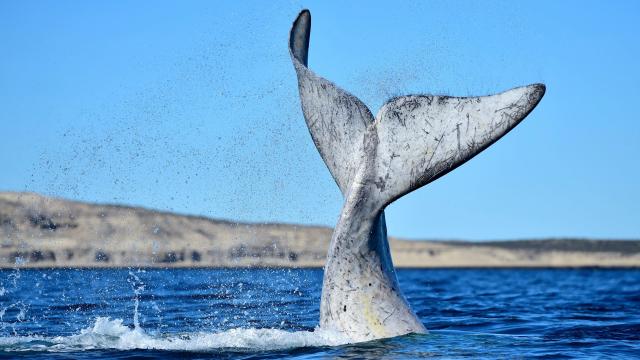The impact of covid-19 lockdowns on wildlife living on land has been clear, but emerging research shows the quiet has extended to the oceans, too.
Five researchers discussed their preliminary findings at a virtually-held meeting at the American Geophysical Union’s annual conference on Wednesday. The decrease in activity has given researchers an unprecedented chance to study what happens when our normally noisy seas go quiet. They show both the extent to which quiet has extended over the oceans and how it is affecting wildlife.
Outside of the drop in ship traffic in New York Harbour after the Sept. 11 terrorist attacks (which reduced whales’ stress), there’s never been a chance to study quieter oceans. The nascent research at AGU could help inform decisions on underwater noise pollution.
Chris Gabriele, a wildlife biologist with the National Park Service at the Glacier Bay National Park in Alaska, monitors sound levels using hydrophones — basically underwater microphones — that scientists placed throughout the bay. Usually, whales in the area have to fight with industry noise to communicate, so they alter their calls accordingly.
“How do whales cope? Well, think about the things that you or I would do if we were trying to communicate in a noisy environment,” she said. “We would probably talk louder. We would keep our words pretty simple. We might have to repeat ourselves, and we might also wait for a quieter time to communicate. And we all seem to do some of the same things.”
But Gabriele said that due to covid-19 restrictions, the region’s waters have seen median daily sound levels decrease by 50% between 2019 and 2020 as fewer recreational cruise ship trips, whale watching, kayak tours, and helicopter rides come to the area. As a result, she’s seen humpback whales hanging out in much broader swaths of Glacier Bay.
“They seem to be taking up much of the space that was made available by the decreased human activity,” she said. “By that, I mean, we saw them out in the middle of the channels, taking naps, socialising and feeding with others. And also on the hydrophone, I heard a lot more long exchanges between the whales.”
Ana Sirovic, an associate professor of marine biology at Texas A&M University at Galveston, is listening to other species like snapping shrimp — which make snapping sounds with their claws to lure in prey — where she conducts research on the coast of the Gulf of Mexico. There, the fossil fuel industry conducts a lot of loud seismic exploration with airguns, but amid the pandemic, much of that activity has come to a grinding halt. She said she hopes her research will determine how the decrease in noise pollution has changed these species’ behaviour.
The research on underwater noise pollution tied to the pandemic is still in its very early stages. It could be months or more before researchers are able to do a more thorough analysis and publish their findings, but the scientists expect their work could yield significant results.
Even as the oceans are getting noisier, our understanding of its full toll on ocean life has remained limited. Sound travels much farther underwater than it does on land. And the ocean can’t discriminate against what sounds carry; the deep coos that humpback whales use to communicate can travel for thousands of miles, but so can the harsh booms of airguns used for seismic gas exploration and the hum of ship traffic. Loud, foreign noises can interfere put undo stress on animals. Research shows that seals, for instance, have an averse response to abrasive noises which can make it more difficult for them to perform basic functions. The new findings could build vastly on our limited knowledge.
“Marine animals use sound to catch prey, to detract predators, to find mates,” Sirovic said. “And you can imagine that human-introduced sounds, if they obscure these animal-made sounds, can have the potential to affect these species substantially.”
They hope their findings can illustrate the importance of quiet marine conditions, which can inform policy once the global economy begins to rebound and shipping activity resumes. We already know some regulations that governments can enact on this front. Slower ships, for instance, tend to make less noise. So do more energy efficient ones, which is also a win for the planet. Managing traffic patterns to mandate certain quiet periods could also help marine ecosystems to thrive.
The International Maritime Organisation, a United Nations’ intergovernmental regulatory agency, already has voluntary guidelines that outline processes for vessels to take to become quieter. But it seems these optional guidelines aren’t enough, because loud ships still get made and marine life is under stress. We need to take noise as seriously as any other form of pollution at sea.
